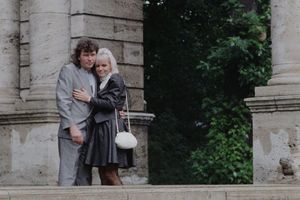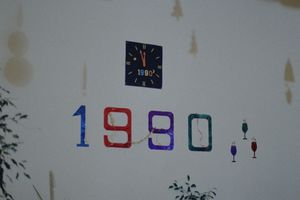Sperrmüll
Regie: Helke Misselwitz, 78 Min., Farbe, Dokumentarfilm
Deutsche Demokratische Republik (DDR)
DEFA-Studio für Dokumentarfilme GmbH, 1990
- Film-/Videoformat
- 35 mm
- Länge in m
- 2154
- Englischer Titel
- Bulky Trash
- Anlaufdatum
Kurzinhalt (Deutsch)
Sie nennen sich "Sperrmüll" und trommeln ihren Unmut auf Gegenstände, die andere weggeworfen haben, vier Jungs, aufgewachsen in den Neubausilos Berlins. Neugierig, was aus ihnen und ihren Träumen wird, beginnen die Dreharbeiten im Frühsommer 1989. Einer von ihnen interessiert das Filmteam besonders. Seine Mutter heiratete einen Westberliner und reist aus der DDR aus. Er entscheidet sich für Ostberlin. Politische und menschliche Befindlichkeiten vor und nach der Wende allgemein und die Einstellung des Sohnes zu Musik, Politik, Familie und Relevanz der großen Veränderungen in der DDR im besonderen werden deutlich.
(Filmobibliographischer Jahresbericht 1990, S. 160f)

(R: Helke Misselwitz, 1990) Fotograf: Heiko Koinzer

(R: Helke Misselwitz, 1990) Fotograf: Heiko Koinzer
Filmstab
- Regie
-
- Helke Misselwitz
- Drehbuch
-
- Helke Misselwitz
- Gerd Kroske
- Kamera
-
- Thomas Plenert
- Schnitt
-
- Gudrun Plenert (geb. Steinbrück)
- Kameraassistenz
-
- Heiko Koinzer
- Thomas Litschew
- Michael Loewenberg
- Dramaturgie
- Ton
-
- Ronald Gohlke
- Uve (auch: Uwe) Haußig
- Patric (auch: Patrick) Stanislawski
- Peter Dienst (Tonmischung)
- Musikinterpret
-
- Sperrmüll (Musikgruppe)
- Bolschewistische Kurkapelle Rot-Schwarz
- Produktionsleitung
-
- Peter Mansee
- Peter Planitzer
- Text
-
- Helke Misselwitz
- Gestaltung
-
- Jochen Härtel (Grafik)
- Sprecher
-
- Helke Misselwitz
Kurzinhalt (Englisch)
In early summer 1989, Helke Misselwitz portrays young musicians in a band who produce their music on other people’s waste items. The four boys call themselves "Bulk Rubbish" and they drum out their resentment, having grown up on the new housing estates of East Berlin.
A straight-up picture of the GDR youth is presented here, which in no way conforms to the official image. The film crew concentrates on the observation of the boy Enrico and his mother Erika: when the mother marries in the West, her son decides to stay in East Berlin, bidding her farewell at the border-crossing. Only shortly after, the tables are turned again: as the events in Berlin leading up to the fall of the Wall are practically captured live from the film crew, Enrico insists on maintaining his cultural identity, even after the fall of the Wall. The "Bulk Rubbish" musicians want to remain citizens of their own state and perceive the looming reunification with scepticism.
General political and human sensitivities before and after Reunification are brought to the fore, along with Enrico’s attitude to music, politics, family and the relevance of the great changes associated with the GDR’s turmoil.
This film, which was originally intended to call for social change, also signals the departure of the director from DEFA.



